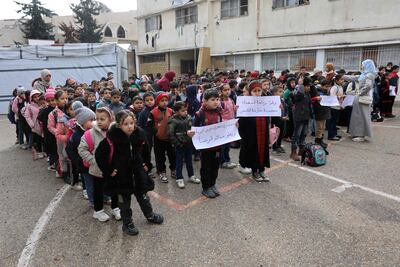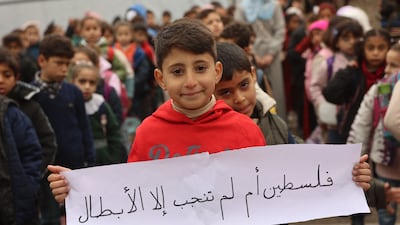Live updates: Follow the latest on Israel-Gaza
Some children have begun returning to schools in Gaza after authorities declared a start to the academic year, in a push for a sense of normality with the enclave in ruins following 15 months of war.
The Ministry of Education said pupils would be offered programmes to catch up on lost learning as well as psychological support to address the devastating effects of the conflict. They would not attend every day, it added.
It is unclear how many schools are reopening, but pupils at two told The National they took classes on Sunday. Others across the strip continue to learn online as many have done throughout the war, with the majority of Gaza's schools destroyed, damaged or turned into shelters.
“Students will begin returning to their schools, following a comprehensive plan developed by the ministry for this purpose,” Dr Khaled Abu Nada, undersecretary for the Ministry of Education, told The National. “The emergency plan considers the difficult circumstances of the students and their challenging lives during the war, including the loss of all educational necessities such as books, bags and stationery.”
Some school buildings have been made available by clearing displaced people who were sheltering inside them. Others are temporary establishments set up through grassroots initiatives during the war.
Much of Gaza has been flattened in the fighting between Israel and Hamas, which was paused last month under a ceasefire deal struck with mediation from the US, Egypt and Qatar. The UN said in a report last week that it would take $53 billion and 10 years to rebuild the territory, including clearing unexploded ordnance and millions of tonnes of rubble.

“The maintenance of classrooms depends on available resources. We are operating at a minimum capacity, with our primary focus on ensuring the educational process resumes smoothly,” Dr Abu Nada said. “Students will not attend daily, and there will be multiple shifts within a single day to accommodate as many students as possible.”
Mohammad Anseyo, a 13 year old from Gaza city, told The National he attended his first day at Al Nasr School. “When the war started, I was in the sixth grade, and now I am in the eighth grade. I completed the seventh grade online over the past few months and, thankfully, managed to pass,” he said.
“The school I went to, which is close to my home, is damaged but less than others. There are shells that hit the buildings, and there's some destruction, but honestly, it’s still much better than other schools,” he added. “There isn’t enough school furniture. Some students sit on chairs and tables, but many sit on the floor.”
Despite the challenging conditions, he is hopeful. “The first day was more about chatting, psychological support, and explaining the plan. I hope in the coming days everything will get better and educational life will return to how it was – or even better,” he said.

Rahma Mousa, a 45-year-old mother of six from Gaza city's Al Rimal area, expressed relief. “We’ve been waiting for this moment eagerly because we want our kids to go back to education, instead of the street life and homelessness they've endured throughout the war months.”
She said she planned to send her children to the nearest functioning school. “To be honest, the details are still unclear, but whatever the situation is, we're just grateful for education to resume in any way possible,” she said.
However, for many families who have been displaced by the fighting, the resumption of education also means giving up their temporary shelter in school buildings. Among them is Mahdi Obeid, 38, a father of five who had been staying at a school in Al Nuseirat in central Gaza after being forced from his home in the city of Jabalia.
“We have nowhere to return to because our home in Jabalia was destroyed,” he told The National. “But despite all this, we decided to leave the school because the educational process, which will benefit thousands of students, is more important.”
Mr Obeid is now living in a tent on open land west of Al Nuseirat, but is nevertheless optimistic. “Over the past year and a half, the children have been deprived of their right to education, and they truly need to make up for everything they've missed," he said. “My two sons, Mohammad and Suhail ... I really hope they can continue their educational journey and achieve the future I've always imagined for them – and even better.”


